Fair threads are cooperative threads run by a fair scheduler which
gives them equal access to the processor. Fair threads can communicate
using broadcast events, and are fully portable as their semantics does
not depends on the executing platform. Fine control over fair threads
execution is possible allowing the programming of specific
user-defined scheduling strategies. This paper presents fair threads
in the context of the Java language, and describes the API to use
them. Link with reactive programming, which is at the basis of the
fair threads proposal, is also considered.
1 Introduction
Contrary to standard sequential programming where the processor
executes a single program, in concurrent programming the processor is
a shared resource which is dispatched to several programs. The term
concurrent is appropriate because programs can be seen as
concurrently competing to gain access to the processor, in order to
execute.
Threads are a basic mean for concurrent programming, and are widely
used in operating systems. They are also introduced in the Java
language as first-class primitive. At language level, threads offer a
way to structure programs by decomposing systems in several concurrent
components; in this respect, threads are useful for modularity.
However, threads are generally considered as low-level primitives
leading to over-complex programming. Moreover, threads generally have
loose semantics, in particular depending on the underlying executing
platform; to give them a precise semantics is a difficult task, and
this is a clearly identified problem to get portable code.
This paper proposes a new framework with clear and simple semantics,
and with an efficient implementation. In it, threads are called
fair; basically, a fair thread is a cooperative thread executed in a
context in which all threads always have equal access to the
processor. Fair threads have a deterministic semantics, relying on
previous work belonging to the so-called reactive approach.
The structure of the paper is as follows: section Threads2
introduces threads and scheduling strategies; the FairThreads
framework is defined in section Fair Thread Framework3; section
Java FairThreads API4 contains the Java API for using FairThreads;
three examples are given in section Examples5; finally, links
with the reactive approach, which is at the basis of the fair thread
proposal, are considered in section Links with Reactive Programming6.
2 Threads
A thread is basically a program, that is a list of instructions and a
program counter which indicates the current instruction to be
executed, as shown on Figure
Thread.

Fig. 1: A Thread
Threads are sharing the same address space and are executed in turn,
one after the other. The processor is allocated to threads by a
scheduler which schedules threads executions.
This gives the drawing of Figure
Scheduler.
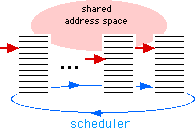
Fig. 2: A Scheduler
When the processor is released by a thread, its execution context has
to be saved in order to be able to resume the thread later. This is
called a context switch. Context switches basically means to save the
program counter and the execution stack associated with the executing
thread, then to restore the context of a new thread (usually, some
others items must also be saved/restored; for simplicity, we do not
consider these).
As opposite to threads, processes have their own private memory
space. This implies that communication between processes is more
complex than communication between threads, which can directly use
shared memory. This also implies that context switches are simpler for
threads, since there is no need to save the address space which always
remains the same. Because threads context switches need less computing
resource than process context switches, threads are sometimes called
lightweight processes. Note also that less memory swaps are needed
using threads than using processes, as threads do not have their own
private memory.
The way the scheduler chooses the thread to be executed is usually
left unspecified; in this way, implementations are less constrained
and, thus, can be more efficient. However, nondeterminism may occurs:
with the same input, several distinct outputs are possible, depending
on the scheduler choices. A major drawback of nondeterminism is that
debugging becomes more complex (for example, faulty executions are
more difficult to replay).
2.1 Scheduling Strategies
|
There are two basic scheduling strategies for chosing the next thread to
execute, called cooperative and preemptive.
In the cooperative strategy, the scheduler has no way to force a
thread to release the processor. Thus, if the executing thread never
releases the processor, then other threads never get a chance to
execute. This situation can occur when, for example, the executing
thread enters in an infinite loop. It is certainly a bug; however, in
a cooperative context, this kind of bug is dramatic as it freezes the
whole system. In order to avoid such situations, threads must
cooperate with other threads and always release the processor after
some time.
In a preemptive strategy, the scheduler can force the executing thread to
release the processor, when it decides to do so. Scheduler can use
several criteria to withdraw the processor from the thread; one
criteria is related to execution time: time slices are allocated to
threads, and context switch occurs when the time slice given to an
executing thread is expired. Other criteria exist, for example
criteria related to priorities; for simplicity, one does not consider
these.
Pros and cons for cooperative and preemptive strategies are the
following:
There is no possibility, in the general case, to decide if a thread is
cooperative or not (this is an undecidable problem). Thus, thread
cooperativeness cannot be checked automatically and is of the
programmer's responsability. This is a real problem for cooperative
strategies, as presence of a non-cooperative thread can prevent the
global system to work properly. On the contrary, presence of
non-cooperative threads is not a problem for preemptive strategies,
because they can be forced to release the processor.
In a cooperative framework, execution of a thread cannot be
interrupted by the scheduler at arbitrary moments. This makes
reasonning on programs easier: actually in a cooperative framework,
thread execution is atomic as long as the thread does not release the
processor. This contrast with preemptive context, where, by default,
the scheduler can freely interleave threads instructions.
In a preemptive context, traditional sequential programs can be
embbeded in threads and run without risk to prevent other threads to
execute. Thus, preemptive schedulers are a good point for
reusability. On the contrary, a "third-party" sequential program
cannot be used just as it is in a cooperative framework, as it could
prevent the whole system to progress.
Preemptive schedulers are less deterministic than cooperative ones.
Actually, both kinds of schedulers have freedom to chose the next
thread to execute; however, a preemptive scheduler has additional
freedom to preempt or not the currently executing thread; this
additional freedom is a supplementary source of nondeterminism.
In preemptive frameworks, access to data in the shared address space
must be protected because thread switches can occur in the middle of
an access. Protection is usually based on use of boolean variables,
called locks; a lock is set (taken) by the thread at the beginning of
the data use and reset (released) by it at the end; while the lock is
taken, other threads willing to access the protected data have to wait
for the lock to be released. The test of a lock and its setting must
be an atomic action, otherwise the scheduler could withdraw the
processor to the thread just in between the test and the setting,
leaving the data unprotected. Programmers are thus, in preemptive
contexts, highly concerned with data protection. However, deadlocks
can occur because of a bad locking strategy (a first thread locks a
data needed by a second thread which similarly holds a lock on a data
needed by the first). On the contrary, data are not to be protected in
a cooperative framework, where threads run atomically. Note that
atomicity of test and set actions is automatic; thus, simple boolean
variables can be safely used for data protection.
Basically, threads unefficiency comes from context switches. In a
preemptive strategy context switches are not under control of the
programmer, but of the scheduler; in some cases, the scheduler thus
introduces context switches which are not necessary but cannot be
avoided by programmers. In a cooperative context, it is the
programmer's responsability to introduce cooperation actions in order
to obtain threads cooperation. One thus generally considers that
cooperative strategies can lead to more efficient executions than
preemptive ones.
2.2 Existing Threading Frameworks
|
Threading systems can be implemented in several ways, depending on the
way kernel resources are used.
On one extreme, there are systems in which user threads are mapped to
kernel threads in a one-to-one way. One get the picture of Figure
One-one-mapping.
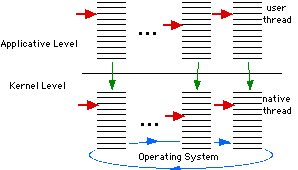
Fig. 3: One-to-One Mapping
As modern operating systems are usually preemptive, this approach
leads to preemptive threading systems. This is the case of Microsoft
NT system. Note that the mapping to kernel threads can be rather
inefficient; for example, all thread manipulations in NT
systematically introduce an overhead of 600 machine cycles
[
11].
On the other extreme, all user threads can be mapped on one unique
kernel thread. This many-to-one mapping correspond to Figure
Many-one-mapping.
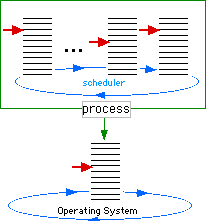
Fig. 4: Many-to-One Mapping
In this approach, scheduler and user threads correspond to one
process, mapped to one single kernel thread. This approach is more
flexible than the previous one, as the choice is left open for the
scheduler to implement either a preemptive or a cooperative strategy,
independently of the operating system characteristics.
There are also intermediate approaches, in which user threads are
mapped to several kernel threads. This is the solution proposed by
the Solaris system of Sun[
4]. In Solaris terminology, user
threads are mapped to
green thread which are grouped in
light
weight processes (LWP). LWPs are the units scheduled by the
operating system. This many-to-many approach is represented on Figure
Many-many-mapping.
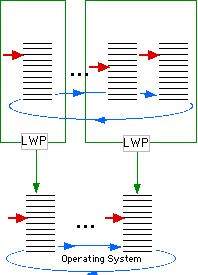
Fig. 5: Many-to-Many Mapping
Note that threads are executed in a cooperative way inside a LWP, but
LWPs are scheduled in a preemptive way by Solaris. Solaris is thus a
mix of cooperative and preemptive strategies.
Thread Libraries and Threads in Languages
|
A lot of thread libraries exist, for a large number of languages.
Among these is the Pthread library [
12] which implements in
C the POSIX standard for threads.
Linux Threads[
2] proposes an implementation of POSIX for
Linux. Each Linux thread is a separate Unix process, sharing its
address space with the other threads (using the system call
clone()). Scheduling between threads is handled by the kernel
scheduler, just like scheduling between Unix processes.
Recently, Gnu Portable Threads[
8] have been proposed with
portability as main objective; they are purely cooperative threads.
Very few languages introduce threads as first class primitives. The
most well-known is of course Java[
6]. Actually, however, Java
basically introduces locks (with the
synchronized keyword), and
not directly threads which are available through an API.
The CML language[
13] is an other language with threads; it
introduces threads in the functional programming framework of ML. CML
threads are run by a preemptive scheduler.
It is very difficult to design threaded systems which run in the same
way on both preemptive and cooperative frameworks. Most of the time,
threaded systems do not fulfill this requirement, and are thus not
portable. In the context of Java, task is even more difficult because
no assumption can be made about the JVM scheduling strategy. No
assumption can neither be made on the way the JVM is implemented
(process, native thread, or something else). In this situation,
programmers have to face a situation where:
- Each thread can be preempted at any time, because scheduling can
be preemptive. This implies that data have to be protected by synchronized code, as
soon as they can be accessed by two distinct threads. These
protections are unnecessary when a cooperative strategy is used.
- Each thread must periodically give up control in order to
cooperate with other threads, because scheduling can be
cooperative. Note that the basic
yield() method for
cooperation has a very loose semantics: it does not force a change of
processor assignment, but only allows it to take place. Note also that
sleep(long), which forces the executing thread to release
processor, is not portable as it depends on the machine execution
speed.
To sum-up, programmers have to code for the worst case for getting
portable concurrent code (one does not consider priorities which do
not at all solve the problem; see [
11] for a
discussion on this point).
Java programmers are faced with a second problem concerning threads:
indeed, ways to get fine control over thread, that is ability to stop,
suspend, or resume threads, have been suppressed from recent versions
of the language[
1]. Reason is that using these means is error
prone (for example, stopping a thread can damage data that where
locked by it). This certainly weaken the language as, without fine
control over threads, it becomes very difficult to program user
specific scheduling strategies.
We are faced to the (seemingly contradictory) following needs:
-
A preemption mechanism is absolutely necessary for code reuse.
-
Thread systems should be as deterministic as possible (in particular,
for debugging concerns).
-
There should be a way to limit to the minimum the use of deadlock
prone constructs such as locks.
-
One should have possibility to get fine control over threads
execution, for being able to program user-defined scheduling
strategies.
-
Thread context switchings, even if they are cheaper than processes
ones, are rather expensive and memory consuming. It should exist a way
to limit them to the strict minimum.
The
FairThreads framework we are introducing now is a proposal solution to
fulfill these needs.
3 Fair Thread Framework
One considers a new framework made of fair threads executed by fair
schedulers. It is presented via a list of questions/answers.
A fair thread is basically a cooperative thread which must never
forgets to cooperate with other threads, by calling the
cooperate() method. Fair threads are run by fair schedulers;
scheduler fairness is twofold:
-
Fair schedulers give each thread an equal possibility to get the
processor. Thus, all threads get an equal right to execute. More
precisely, fair schedulers define execution phases where all started
threads run up to their next cooperation point, as shown on Figure
Fair-scheduler.

Fig. 6: Fair Scheduler
- Fair scheduler always dispatch the same information to all
threads.
More precisely, a fair scheduler broadcasts events to all threads
started in it. Thus, all threads see events in
exactly the same way, because they are broadcast. Moreover, events can
have values associated to their generations, and these values are also
broadcast.
The
FairThreads framework is basically cooperative; it is thus simpler than
preemptive ones. Indeed, as preemption cannot occurs in an
uncontroled way, cooperative frameworks are less
undeterministic. Actually,
FairThreads puts the situation to an
extreme point, as it is fully deterministic; threads are chosen for
execution following a strict round-robin algorithm. This can be a
great help in programming and debugging.
FairThreads provides users with a powerful communication mean
that is event broadcasting. This simplifies concurrent programming
while reducing risks of deadlocks.
Events are used when one wants one or more threads to wait for a
condition, without need for them to poll a variable to determine when
the condition is fulfilled. Broadcast is a mean to get modularity, as
the thread which generates an event has nothing to know about
potentially receivers of it. Fairness in event processing means that
all threads waiting for an event receive it during the same phase
where it is generated; thus, a thread leaving control to cooperate
with other threads does not risk to loose an event generated later in
the same phase. Note that scheduler phases actually define time scopes
of events.
Fair threads are implemented in the Java programming language and
usable through an API. Fair thread implementation is based on
standard Java threads, but it is independent of the actual JVM and OS,
and is thus fully portable. Fair schedulers are actually at the level of
the Java Virtual Machines; one thus have the situation shown on Figure
Implementation.
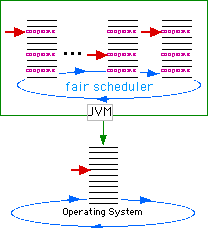
Fig. 7: Implementation
As fair threads are basically cooperative, no lock is needed when
accessing a shared object. While executing, a fair thread cannot be
interrupted by another fair thread; thus, execution is atomic and
there is no need of synchronized code. This contributes to minimize
deadlock situations which are the plague of concurrent programming.
Priorities are meaningless in a fair context, where threads always
have equal rights to execute. Absence of priorities also contributes
to simplify programming. Note that the effect of priorities in Java is
rather unclear (see [
11] for a discussion on this matter).
A preemptive strategy is sometimes needed, for example to reuse a
piece of code which was not designed to be run concurrently. In the
context of fair threads, preemption is possible through the notion of
a fair process, assuming that the operating system is preemptive. A
fair process gives life to a standard process which is executed by the
operating system concurently with the JVM running the fair
scheduler. This gives the drawing of Figure
Fair-process, where the fair process is represented as a
black box.
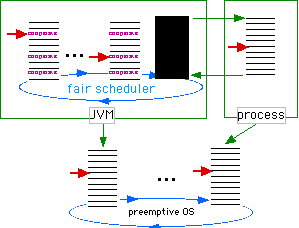
Fig. 8: Fair Process
Note that one gets an instance of the many-to-many approach presented
in section
Existing Threading Frameworks2.2.
Up to now, one has only considered uniprocessor machines. When
several processors are available, several threads can be
simultaneously executed; this situation is often called
parallelism. As threads are sharing the same address space, data
protection becomes mandatory. Actually, this is very similar
to preemptive scheduling; in both cases, shared data
have to be protected against concurrent accesses, and it is the
programmer's responsability to avoid deadlocks.
Fair threads are designed for uniprocessor machines, and it is left
for future work to adapt them to multiprocessor ones.
What about Signals and Interrupts?
|
In operating systems, signals can occur at any moment during
execution, and are to be processed without delay. Signals are useful
to implement interrupts, for example asynchronous IO interrupts. In
the context of fair threads, signals are quite naturally represented
by events, which can be generated at any moment. Fair threads also
offer
the possibility for generated values to be immediately processed:
generated values associated to events are broadcast to all components,
and are received by them without delay, that is during their
generation
phase.
4 Java FairThreads API
The FairThreads framework is contained in a Java package named
fairthread. Three main interfaces are defined in it:
Event for events,
FairThreadInterface for fair threads,
and
FairSchedulerInterface for fair schedulers.
The interface
Event basically defines two methods: one for
hashcoding events, and one for comparing them; these two methods are
the minimum needed for implementing events.
1: public interface Event
2: {
3: boolean equals(Object object);
4: public int hashCode();
5: }
A possible implementation of events is the class
StringEvent in
which they are considered as strings:
1: public class StringEvent implements Event
2: {
3: public String identity;
4: public StringEvent(String s){ identity = s; }
5: public int hashCode(){ return identity.hashCode(); }
6: public boolean equals(Object object){
7: if (object instanceof StringEvent)
8: return identity.equals(((StringEvent)object).identity);
9: return false;
10: }
11: }
4.2 Fair Thread Interface
|
The interface of fair threads is the following:
1: public interface FairThreadInterface
2: {
3: void run(FairScheduler scheduler);
4: void start(FairScheduler scheduler);
5: void stop(FairScheduler scheduler);
6: void suspend(FairScheduler scheduler);
7: void resume(FairScheduler scheduler);
8:
9: void cooperate();
10: void cooperate(long delay);
11:
12: void join(FairThread thread);
13: void join(FairThread thread,long delay);
14:
15: void generate(Event event);
16: void generate(String event);
17: void generate(Event event,Object val);
18: void generate(String event,Object val);
19:
20: void await(Event event);
21: void await(String event);
22: void await(Event event,long delay);
23: void await(String event,long delay);
24:
25: final static public Object NULL = new Object();
26: Object nextValue(Event event);
27: Object nextValue(String event);
28: }
- Method
run(FairScheduler s) is the basic method executed
by the fair thread; s is the fair scheduler that runs the
thread. By
default, the method does nothing. This method corresponds to the
run() method of standard Java threads.
- Method
start(FairScheduler s) starts execution of the
fair thread by s. It corresponds to the start() method
of standard threads.
- Method
stop(FairScheduler s) stops the fair thread run by
s.
It corresponds to the stop() method of Java version 1, which is
now deprecated.
- Method
suspend(FairScheduler s) is used to suspend the
fair thread run by s; execution can be resumed by calling the
resume(FairScheduler) method. It corresponds to the
suspend() method of Java version 1 which is now deprecated.
- Method
resume(FairScheduler s) resumes the thread,
previously suspended by a call to
suspend(FairScheduler).
It corresponds to the suspend() method of Java version 1 which
is now deprecated.
- Method
cooperate() is the method to be called by the fair
thread to cooperate with other threads; it is the basic mechanism of
FairThreads. It corresponds to
yield() of standard threads.
- By calling method
cooperate(long n) the fair thread falls
asleep during n phases. The method corresponds to the
sleep(long) method of standard threads. Actually,
cooperate(n)
is a loop that runs cooperate() n times.
- Method
join(FairThread t) waits for the termination of
the fair thread t. It corresponds to method
join() of standard threads.
- Method
join(FairThread t,long n) waits for
termination of the fair thread t during at most n
phases. It corresponds to the method join(long) of standard
threads.
- Method
generate(Event e) generates the event e.
All fair threads waiting for e automatically receive it,
because it is
broadcast by the fair scheduler running the thread. Actually, events
correspond more or less to condition variables of
Pthreads[12],
and generate(Event) is the counterpart of
pthread_cond_broadcast. Method generate(String s)
is similar, s being converted to an event.
-
Method
generate(Event e,Object o) generates e with
o as generated value. Method generate(String s,Object o)
is similar, s being converted to an event.
-
Method
await(Event e) waits for e. It corresponds to the
function called pthread_cond_wait of Pthreads. Method
await(String s) is similar, s being converted to an
event.
-
Method
await(Event e,long n) waits for event e during at
most n phases. It corresponds to the function called
pthread_cond_timedwait of Pthreads.
Method await(String s,long n) is similar, s being
converted to an event.
-
Method
nextValue(Event e) returns the next value of e
generated during the current phase. Value NULL is
returned if the value generated was null.
Value null is returned if no new generated value is
available. In this last case, nextValue remains blocked
up to the end of the current phase, and returns during the next phase
(indeed, absence of a value is impossible to decide before the end of the
current phase, as otherwise it could be produced by a thread
scheduled later in the same phase). Method nextValue(String s) is
similar, s being converted to an event.
4.3 Fair Scheduler Interface
|
Interface of fair schedulers is the following:
1: public interface FairSchedulerInterface
2: {
3: void broadcast(Event event);
4: void broadcast(String event);
5: void broadcast(Event event,Object val);
6: void broadcast(String event,Object val);
7:
8: void start(FairThread thread);
9: void stop(FairThread thread);
10: void suspend(FairThread thread);
11: void resume(FairThread thread);
12: }
-
Method
broadcast(Event e) broadcasts e to all executing
fair threads. Method broadcast(String s) is similar,
s being converted to an event.
Method broadcast(Event e, Object o) broadcasts e, with
o as generated value. Method
broadcast(String s,Object o) is similar, s being
converted to an event.
-
Method
start(FairThread t) starts t. The call
scheduler.start(thread) is equivalent to
thread.start(scheduler).
-
Method
stop(FairThread t) stops t. The call
scheduler.stop(thread) is equivalent to
thread.stop(scheduler).
-
Method
suspend(FairThread t) suspends t. The call
scheduler.suspend (thread) is equivalent to the call
thread.suspend(scheduler).
-
Method
resume(FairThread t) resumes thread t. The call
scheduler.resume (thread) is equivalent to
thread.resume(scheduler).
Fair threads are instance of the
FairThread class which extends
the standard class
Thread. Class
FairThread implements
interface
FairThreadInterface and has two constructors:
1: public FairThread()
2: public FairThread(Fair fair)
-
The first constructor is used to create a fair thread with the default
empty
run (FairScheduler) method. It corresponds to the
constructor without parameter of the class Thread.
-
The second constructor creates a fair thread from a fair object (see
section \ref{Fair Interface}) given as argument. It corresponds to
the constructor with a
Runnable parameter of the class
Thread.
Fair schedulers are instances of the class
FairScheduler which has
one single constructor:
1: public FairScheduler()
Usually, a fair scheduler is created at starting of the main
application method, and is used later to start fair threads created
during execution.
Interface
Fair is to be implemented by objects given to the
fair thread constructor. It corresponds to the
Runnable
interface of standard Java threads.
1: public interface Fair
2: {
3: void run(FairScheduler scheduler,FairThread thread);
4: }
-
The
run(FairScheduler s,FairThread t) method is the basic
method executed by fair thread t, run by the fair scheduler
s.
A fair process corresponds to a standard process created by the call
exec(String) of the class
Runtime, with the difference that
it can be safely immerged in the
FairThreads framework. Fair processes are
instances of the class
FairProcess which extends
FairThread; it has one single
constructor:
1: FairProcess(String command)
The string in argument is interpreted as a command and it is parsed
exactly in the same way the method
Runtime.exec does.
5 Examples
Three examples are described. The first one is a very simple but
complete example in which two fair threads are run. In the second
example, one defines a preemption mechanism to stop a fair thread when
an event becomes present. The third example considers generated values
and defines a way to process them.
Here is a small example of a complete program that runs two fair
threads. The first one cyclically prints
hello, , and the
second one prints
world. The main method of the program first
creates a fair scheduler, and then starts the two threads in it.
1: import fairthread.*;
2:
3: class Say extends FairThread
4: {
5: String msg;
6: public Say(String msg){ this.msg = msg; }
7:
8: public void run(FairScheduler scheduler){
9: while(true){
10: System.out.print(msg);
11: cooperate();
12: }
13: }
14: }
15:
16: public class HelloWorld
17: {
18: public static void main(String[] args){
19: FairScheduler scheduler = new FairScheduler();
20: scheduler.start(new Say("hello, "));
21: scheduler.start(new Say("world!
22: "));
23: }
24: }
Several points are important:
-
Output is an infinite list of
hello, world messages. This is
because the first thread, after printing the first part of the message,
always leaves the processor and thus lets the second thread print the last
part of it.
- Output is always the same; the program is totally deterministic.
- Without the
cooperate() call in Say, the
program would enter in a loop, printing hello forever; cooperate() is mandatory because FairThreads is basically
cooperative.
Using the
Fair interface, the previous program could be
equivalently written as:
1: import fairthread.*;
2:
3: class Say implements Fair
4: {
5: String msg;
6: public Say(String msg){ this.msg = msg; }
7:
8: public void run(FairScheduler scheduler,FairThread thread){
9: while(true){
10: System.out.print(msg);
11: thread.cooperate();
12: }
13: }
14: }
15:
16: public class HelloWorld
17: {
18: public static void main(String[] args){
19: FairScheduler scheduler = new FairScheduler();
20: scheduler.start(new FairThread(new Say("hello, ")));
21: scheduler.start(new FairThread(new Say("world!
22: ")));
23: }
24: }
The main point is that, in this way, class
Say can extend an other
class; this is not possible with the first program, as multiple
inheritance of classes is forbidden in Java.
5.2 Stopping Threads with Events
|
One defines a class
Until which extends
FairThread, with
an associated class
Controller.
Until runs a method, called
controlled,
and starts an instance of
Controller which stops the
Until thread when an event becomes present. Here is definition
of
Until:
1: import fairthread.*;
2:
3: public class Until extends FairThread
4: {
5: String event;
6:
7: public Until(String event){ this.event = event; }
8:
9: public void controlled(FairScheduler scheduler){}
10:
11: public final void run(FairScheduler scheduler){
12: FairThread controller = new Controller(event,this);
13: scheduler.start(controller);
14: controlled(scheduler);
15: scheduler.stop(controller);
16: }
17: }
18:
19: class Controller extends FairThread
20: {
21: FairThread controlled;
22: String event;
23:
24: public Controller(String event,FairThread controlled){
25: this.event = event; this.controlled = controlled;
26: }
27:
28: public void run(FairScheduler scheduler){
29: await(event);
30: scheduler.stop(controlled);
31: }
32: }
This example gives a hint of how one can program sophisticated
user-defined execution strategies for fair threads, using broadcast
events.
A
scanner is a thread which is associated to one event and which runs
a special callback method each time a value is generated for the
event. The notion of a scanner comes from the new version of the
SugarCubes[
5] framework. Scanners extends the following
Scanner class, redefining the
callback method:
1: public class Scanner extends FairThread
2: {
3: String event;
4: public Scanner(String event){ this.event = event; }
5:
6: void callback(Object obj){}
7:
8: public void run(FairScheduler scheduler){
9: while(true){
10: await(event);
11: while(true){
12: Object obj = nextValue(event);
13: if (obj == null) break;
14: callback(obj);
15: }
16: }
17: }
18: }
At each phase, all generated values are processed during it; moreover,
after the processing of the last value, the call of
nextValue blocks, waiting
for the next phase to return the
null value.
6 Links with Reactive Programming
When considering the
Until class of section
Stopping Threads with Events5.2, one
can see that there is no real need for using two distinct threads. Indeed, it
would be possible to merge the instructions of the controler with the
ones of the controlled method; in this way, the
Until thread
would also test for the event presence, at fixed moments, say, just
before execution of the
cooperate method. Thus, unnecessary
context switchings would be saved, which would leads to a more
efficient execution. Such a solution is of course more difficult to
program and less modular as the code of
the controlled method must be transformed.
The fair framework offers a way to conciliate efficiency and
programming ease through the use of reactive programs. Reactive
programs are basic elements of the Junior
framework [
9] which
is a set of Java classes for reactive programming. Junior programs are
usable through an API called Jr[
10].
Comparison of threads and of
SugarCubes, a framework closely related to Junior, can be found in
[
7]. The Web site [
3] contains references to
reactive programming.
Reactive programming is based on the notion of an instant which is
shared by all concurrent components. Reactive programs are made of
basic instructions, with semantics defined in term of instants. For
example, the instruction
Stop() of Junior stops execution for the
current instant, and execution at the next instant restarts in sequence
from it. Event based programming is possible in Junior; events are
instantaneously broadcast: an event generated during one instant is
received by all components waiting for it during the same instant.
Correspondance between fair threads and Junior is straigtforward: a
Junior instant corresponds to a fair scheduler phase, where all
threads are executed once; events have exactly the same semantics in
the two contexts; the cooperate() method of fair threads
corresponds to the Stop() instruction of Junior.
Junior programs can be used in the context of fair threads, by the
intermediate of class JrProgWrapper which extends
FairThread. For example, consider the class:
1: public class Kill extends Until
2: {
3: String msg;
4: public Kill(String s){ super("E"); msg = s; }
5: public void controled(FairScheduler scheduler){
6: for(int i = 0; i < 100; i++){
7: System.out.print(msg+"init ");
8: cooperate(5);
9: System.out.print(msg+"end ");
10: }
11: }
12: }
The equivalent class, made of a reactive program of type
Program, is the following:
1: public class Kill extends JrProgWrapper
2: {
3: Program prog =
4: Jr.Until("E",
5: Jr.Repeat(100,
6: Jr.Seq(Jr.Atom(new Print(msg+"init ")),
7: Jr.Seq(Jr.Repeat(5,Jr.Stop()),
8: Jr.Atom(new Print(msg+"end "))))));
9:
10: public Kill(){ super(); setProgram(prog); }
11: }
Actually, instructions of concurrent programs in Junior are
interleaved (by the
Par operator) during each instant, in a way
that allows broadcast of events. This approach is different from the
one of threads, as there is no need of context switching in Junior;
actually, context switches are replaced in reactive programming by
interleavings, as shown on Figure
Merge.

Fig. 9: Merge of Reactive Instructions
The absence of context switching is a good point for efficiency. Let
us return to the
Kill example of previous section. We consider
N threads and measure time T (in milliseconds) taken to run them (on a
MacIntosh G3, without printing). For N=100, one has T=6533ms. Now,
running the equivalent
JrProgWrapper gives T= 1577ms. For
N=500, T=31189ms with
FairThread, and T=3685ms with
JrProgWrapper.
Note that reactive programs consume less memory than threads; last
experiment, with N=500, needs 8.7MB with
JrProgWrapper, and
79.3MB using threads. The overhead of memory used by threads is a
well-known problem; for example, with N=1000, it has not been possible
to run the previous example using threads, while no problem arise
using a reactive program.
7 Conclusion
One has defined a new framework for concurrent programming in Java,
based on the notion of a fair thread. Fair threads are run by fair
schedulers which give threads equal rights to get the processor and
equal rights to receive broadcast events.
The FairThreads framework makes a clear separation between the
cooperative world and the preemptive one. Fair threads are basically
cooperative, and it is the programmer's responsability to program
cooperation with other threads. However, there exists a way to embed
non-cooperative code in FairThreads, through the notion of a
fair process.
FairThreads has a clear and simple semantics, relying on the
reactive approach. As a consequence, FairThreads programs are basically
deterministic and fully portable.
Fair threads are of valuable help with uniprocessor machines to get
portable, simple, and efficient code.
The API of the FairThreads framework and its implementation are
available on the Web [3].
Thanks to Julien Demaria, Loic Henry-Greard, Xavier Leroy, Fabrice
Peix, and Jean-Ferdy Susini for their valuable comments and
suggestions on a previous version of the paper.
| [1] | -- Java Web Site. |
| [2] | -- LinuxThreads Web Site. |
| [3] | -- Reactive Programming Web Site. |
| [4] | -- Solaris Web Site. |
| [5] | -- SugarCubes Web Site. |
| [6] | Arnold, Ken and Goslin, James -- The Java Programming Language -- Addison-Wesley, 1996. |
| [7] | Boussinot, F. and Susini, J-F. -- Java Threads and SugarCubes -- Software Practice and Experience, 30(14), 2000, pp. 545--566. |
| [8] | Engelschall, Ralf S. -- Portable Multithreading -- Proc. USENIX Annual Technical Conference, San Diego, California, 2000. |
| [9] | Hazard, L. and Susini, J-F. and Boussinot, F. -- The Junior reactive kernel -- Inria Research Report, RR-3732, july, 1999. |
| [10] | Hazard, L. and Susini, J-F. and Boussinot, F. -- Programming with Junior -- Inria Research Report, RR-4027, 2000. |
| [11] | Hollub, A. -- Taming Java Threads -- Apress, 2000. |
| [12] | Nichols, B. and Buttlar, D. and Proulx Farrell J. -- Pthreads Programming -- O'Reilly, 1996. |
| [13] | Reppy, John H. -- Concurrent Programming in ML -- Cambridge University Press, 1999. |








